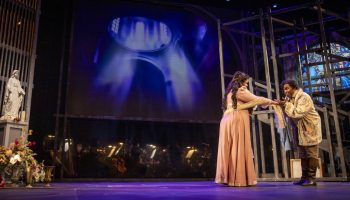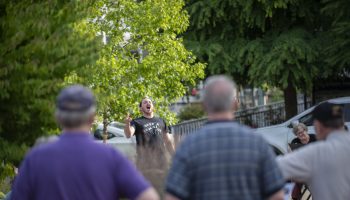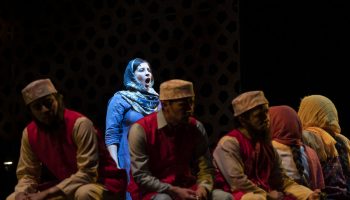
Last August, as she was finalizing plans to be the Chautauqua Opera Company’s 2020 Composer-in-Residence, Frances Pollock got a sinking feeling.
“I had this feeling in my gut; I was like, ‘I don’t think I’m going to be at Chautauqua next summer,” said Pollock, a Connecticut-based composer and rising star in the opera world. “We got to February, and the funding was all there and we were all set up, and they made the announcement (that I was coming), but I still had that feeling. I don’t think I could have seen into the future that there was going to be a global pandemic, but I definitely had a creepy premonition.”
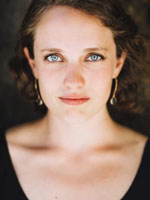
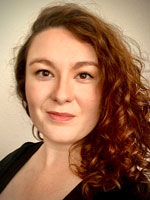
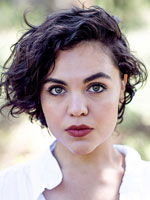
Premonition aside, Pollock was surprised by Chautauqua Opera’s commitment to keep her and the company’s Young Artists on for the Institution’s virtual season.
“Instead of just canceling the whole season and throwing their hands up and trying to hunker down and stay just as they are, Chautauqua has totally revolutionized how they consider their season,” she said. “And they’ve wrapped themselves around their Young Artists, saying, ‘You guys are the ones that are important now.”
With that in mind, and a knowledge of the restrictions a remote opera program presents, Pollock and Chautauqua Opera General and Artistic Director Steven Osgood made a plan that would engage Pollock and Chautauqua Opera’s 20 Young Artists in an experience as unique as the situation that created it.
Pollock decided to compose a 20-song cycle, where each Young Artist would sing a short, a cappella “micro-piece” about their personal experiences during the pandemic.
“Coming into this season of isolation, where most people don’t have collaborators they can have in the room with them as an accompanist, we looked to create new pieces that, when they were performed … unaccompanied, (it) would be exactly what the composer and librettist intended,” Osgood said during one of the season’s Cocktails Concerts and Conversations with Chautauqua Opera events.
“(Osgood) took that idea and ran with it,” Pollock said. “He reached out to Jerre (Dye) and said, ‘I have the perfect collaborator for you.’ And he did.”
Dye is an award-winning playwright, opera librettist, director and actor based in Chicago.
“I’ve wanted to work with him for a long, long time,” Pollock said. “He’s worked with every composer.”
According to Dye, the two clicked immediately. They started their collaboration by conducting 45-minute to hour-long interviews with each Young Artist — an extensive, four-day process.
There’s something kind of incantatory about the idea of a singer singing their own language,” Dye said. “When a singer sings about hope, and that sentence about hope was derived from their own mind and mouth and heart, I think that creates a different sound. I think it creates something quite magical.”
“I think that was a really good thing for the project,” Pollock said. “It established a connection between us, and I think the comfort level which usually takes a little while in a collaboration (was) just immediately solidified right there in the beginning.”
Pollock and Dye worked at a breakneck pace throughout the Opera’s nine-week season, with Dye writing poems based on the Young Artists’ interviews, and Pollock taking his words and turning them into an a cappella piece in a matter of days. The pieces were premiered two- to- three-at-a-time during Chautauqua Opera’s weekly Cocktails, Concerts and Conversations events. The full cycle can now be viewed through a playlist on Chautauqua Opera’s YouTube channel.
“(Dye) has to submit two to three individual texts (a week), and then synthesizes the next week’s (pieces), and I’m doing the same thing just a couple days behind him,” Pollock said. “It’s a much quicker process than I’ve ever done, but I kind of like it.”
After completion, the pieces were turned over to the Young Artists, who workshopped them with Pollock and Dye, but ultimately had full creative control over their recorded performance.
“The singers are being producers; they’re self-directing,” Dye said.
“It shows how liberating limitations can be by not having an accompanist and having to be a self-producer,” Pollock said. “I feel like this is a fledgling new territory that has all the potential to be explored. It’s actually really exciting.”
For many of the Young Artists, this was the first time they ever had a song composed specifically for them. They were shocked at how Pollock and Dye were able to create pieces that felt so personal from only a short conversation.
“It was hard to sing, because it was about (me),” said Young Artist Kelly Guerra, who premiered her piece, “I Moved Here During All of This” during Week Three. “I’m so used to putting a mask on, being a character or making up a character, and I found it very difficult to just be myself. … It was a unique and gratifying challenge.”
The pieces ranged from humorous to somber, frustrated to hopeful, each a snapshot of an artist processing the events of the last few months.
“What I love about my piece (is) these lines at the end; ‘I want to sing, but nothing comes.’ I say that twice,” said Young Artist Hilary Grace Taylor, who also premiered her piece, “I’m Very Much a Texas Girl,” during Week Three. “That can mean so many different things right now. … (This text) speaks to so many different things, in so many different ways, that each person will have a different experience hearing it.”
For Pollock, the experience of working so closely with performers, despite being so physically distant, has been a radical one.
“These singers, they have this incredible instrument, but they’re also these incredible minds and these incredible resources and vessels of information and thought and experiences,” she said. “To be able to tap into the full performer like that, I just don’t want to create art any other way, and I think I was aware of that — I always felt like it was missing for me — but now I don’t think I can go back.”
Most of the lines in Dye’s poems come directly from the artist’s interviews, giving the pieces another layer of intimacy.
“There’s something kind of incantatory about the idea of a singer singing their own language,” Dye said. “When a singer sings about hope, and that sentence about hope was derived from their own mind and mouth and heart, I think that creates a different sound. I think it creates something quite magical.”


